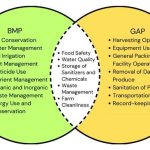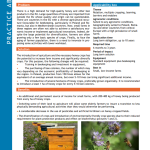Diving into the world of agripreneurship can be both exciting and rewarding. Yet, like any new venture, it comes with its own set of challenges.
If you’re thinking about starting your own agricultural business, it’s essential to tread carefully. Many new agripreneurs make avoidable mistakes that can lead to unnecessary setbacks. Imagine pouring your energy, time, and resources into your passion, only to stumble over common hurdles that could have been easily sidestepped.
This guide is crafted to help you navigate the path to success by highlighting these common pitfalls. Stay with us as we unravel the missteps that you should be wary of, ensuring your agripreneurial journey is as smooth and fruitful as possible.

Lack Of Market Research
Many new agripreneurs fail due to inadequate market research. Ignoring consumer needs and trends can lead to poor business decisions. Understanding the market ensures better strategies and growth opportunities.
Entering the world of agripreneurship can be an exciting journey. However, one common mistake that many new agripreneurs make is neglecting thorough market research. Understanding your market is crucial to building a successful agricultural business. Without it, you risk investing time and resources into products or services that may not meet the needs of your target audience.Understanding Your Target Market
It’s essential to know who your customers are. What do they need? What are their preferences? By identifying your target market, you can tailor your products to meet their specific demands. For example, if you’re selling organic produce, ensure there’s a demand for it in your area. You might think everyone wants organic, but without research, you could be selling to a market that prefers conventional farming products.Analyzing Competitors
Have you examined who else is offering similar products or services? Competitor analysis helps you understand what others are doing right—and wrong. By learning from competitors, you can differentiate your offerings and create a unique value proposition. You might notice that a competitor offers home delivery, something you hadn’t considered. This insight could set you apart and attract more customers.Identifying Market Trends
Are you aware of the latest trends in your industry? Staying updated with market trends helps you anticipate changes and adapt accordingly. For instance, the rise of plant-based diets has increased the demand for alternative protein sources. If you know this trend, you can adjust your business strategy to cater to this new demand.Testing Your Product
Before fully launching, have you tested your product with a small segment of your market? Conducting trials or small-scale launches can provide valuable feedback. This step can prevent costly mistakes. You might discover that customers prefer a different packaging style or need clearer labeling.Using Data To Make Decisions
Do you rely on data to guide your business decisions? Data-driven insights are invaluable. They help you identify patterns, measure success, and make informed decisions. If you’re not utilizing data, you might be missing opportunities to optimize your operations or marketing efforts. By prioritizing market research, you lay the foundation for a resilient and responsive agribusiness. Don’t underestimate the power of knowing your market inside and out. What’s one step you can take today to deepen your market understanding?
Ignoring Financial Planning
New agripreneurs often make the mistake of ignoring financial planning. This oversight can lead to unexpected expenses and reduced profits. Understanding budgets and forecasting is essential for sustainable growth in agriculture.
Starting a venture in agriculture is an exciting journey. However, one major misstep that new agripreneurs often make is ignoring financial planning. Without a solid financial plan, even the most promising agribusiness can falter. This oversight can lead to cash flow issues, unexpected expenses, and ultimately, business failure. Let’s delve into why financial planning is crucial for your agribusiness success.What Happens When You Ignore Financial Planning?
Ignoring financial planning can leave you blindsided by costs you didn’t anticipate. Picture this: you’ve invested heavily in high-quality seeds and fertilizers, but come harvest time, you realize you’ve run out of funds for transportation and market fees. This scenario is more common than you think. Financial planning helps you map out all potential expenses, ensuring you’re prepared for every step of the process.Why Is Financial Planning Crucial For Agripreneurs?
Financial planning is your roadmap to profitability. It helps you set realistic goals and allocate resources efficiently. By keeping track of your income and expenses, you can identify areas where you can cut costs. This planning also enables you to manage risks better, such as price fluctuations or crop failures. Without it, you might find yourself constantly reacting to problems rather than proactively managing your business.How To Create An Effective Financial Plan?
Start by listing all your expected expenses, from equipment and seeds to labor and marketing. Use past data if available, or consult with experienced agripreneurs for estimates. Create a budget and stick to it, but also allow for a contingency fund for unexpected costs. Regularly review and adjust your plan as your business grows. This proactive approach will keep your finances healthy and your business on track.Personal Story: Learning The Hard Way
I once met an agripreneur who learned the importance of financial planning the hard way. In his first year, he focused solely on production quality, ignoring financial details. By the end of the season, he was hit with storage costs he hadn’t planned for. This taught him to prioritize financial planning, which led to improved budgeting and a much smoother second year. This story highlights how crucial financial planning is in avoiding costly surprises.Are You Ready To Prioritize Financial Planning?
Take a moment to assess your own approach. Are you keeping a close watch on your finances? Do you have a clear budget in place? Financial planning might seem daunting, but it’s a critical step in ensuring the longevity and success of your agribusiness. By taking the time to plan, you’re setting yourself up for a more stable and prosperous future in agriculture.Overlooking Sustainable Practices
New agripreneurs often overlook sustainable practices, leading to environmental harm and financial losses. Using eco-friendly methods helps preserve resources and reduces long-term costs. Embracing sustainability enhances farm productivity and builds a positive reputation.
Overlooking sustainable practices can be a pitfall for new agripreneurs. In the rush to get their ventures off the ground, many neglect the importance of sustainability. This oversight not only impacts the environment but can also affect the long-term success of their business. Embracing sustainable methods from the start can lead to more resilient and profitable operations. An agripreneur I once met, Sarah, shared how she underestimated the importance of sustainability in her early farming days. Initially, she focused solely on maximizing yield without considering environmental impact. It wasn’t long before she noticed soil degradation and a drop in crop quality. She quickly learned that sustainable practices weren’t just a “nice-to-have” but essential for her farm’s health and productivity. Here’s what you should keep in mind to avoid similar setbacks:Understanding The Impact Of Unsustainable Practices
Ignoring sustainability can lead to soil erosion, water pollution, and loss of biodiversity. These issues can severely affect your farm’s productivity. Are you willing to sacrifice your farm’s future for short-term gains?Implementing Soil Conservation Techniques
Simple techniques like crop rotation and cover cropping can maintain soil health. They prevent erosion and enhance fertility. Have you considered how these methods could improve your farm’s yield?Utilizing Water Efficiently
Efficient water management is crucial. Techniques such as drip irrigation save water and ensure crops get the moisture they need. Are you making the most of your water resources?Choosing Eco-friendly Pest Management
Relying on chemicals can harm beneficial insects and lead to resistance. Integrated pest management (IPM) offers a sustainable alternative. How are you controlling pests on your farm?Reducing Waste And Recycling
Composting and recycling can reduce waste and improve soil quality. These practices also lower your farm’s carbon footprint. What steps are you taking to manage waste sustainably?Engaging With The Community
Building a network with local farmers can provide valuable insights into sustainable practices. Sharing resources and knowledge can lead to better outcomes for all. Have you reached out to your community for support and ideas? Sustainable practices are not just an environmental concern but a business strategy. Are you ready to make sustainability a priority in your agribusiness?
Neglecting Technological Advancements
Many new agripreneurs ignore technological advancements, missing valuable tools for growth. Modern farming tech can boost efficiency and profits. Embracing innovation helps stay competitive in the agricultural market.
Neglecting technological advancements in agriculture can be a costly oversight for new agripreneurs. In today’s fast-paced world, technology plays a crucial role in optimizing productivity and increasing efficiency. Ignoring these tools can leave you trailing behind competitors who are eager to innovate and adapt.Understanding The Role Of Technology In Modern Agriculture
Technology is no longer just a luxury; it’s a necessity in farming. Advanced machinery, drones, and smart sensors can monitor crop health and soil conditions, providing real-time data. By using these technologies, you can make informed decisions that directly impact your yield and profitability.Embracing Precision Agriculture
Precision agriculture is all about using technology to optimize field-level management. It involves using data to guide farming decisions, ensuring resources like water and fertilizers are used efficiently. Have you considered how GPS-guided tractors or automated irrigation systems could benefit your farm?Avoiding The Pitfalls Of Tech Overload
While technology offers many benefits, it’s easy to get overwhelmed. Start small by integrating one or two tools that address your most pressing challenges. It’s essential to strike a balance between adopting new tech and maintaining what already works for your business.The Cost Of Ignorance
Failing to keep up with technological advancements can lead to increased costs and missed opportunities. A friend of mine, who runs a small farm, resisted using crop management software for years. When he finally adopted it, he realized how much time and money he had lost by not making the switch sooner.Staying Informed And Educated
Regularly updating your knowledge about technological trends is crucial. Attend workshops, webinars, and agricultural fairs to learn about the latest innovations. How often do you dedicate time to expanding your tech knowledge?Building A Tech-savvy Team
Surround yourself with a team that understands the value of technology in agriculture. Encourage staff to engage with tech training sessions and bring their insights to the table. A tech-savvy team can be your greatest asset in navigating the complexities of modern farming.Investing In The Right Technology
Not every technological advancement will suit your farm. Carefully assess your needs and budget before making investments. What specific tech solutions align with your business goals? By addressing these considerations, you can avoid the common mistake of neglecting technology, ensuring your agribusiness thrives in a competitive market.Conclusion
Starting a new agribusiness can be challenging. Mistakes happen. But learning from them is key. Focus on planning and research. Understand your market and customers well. Avoid rushing decisions. Build a strong network for support. Stay flexible and open to change.
Success requires patience and persistence. Remember, every mistake is a lesson. Keep learning and growing. With dedication, your agribusiness can thrive. Stay committed to your goals. Your journey in agripreneurship is just beginning. Embrace the challenges and enjoy the rewards.



